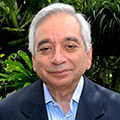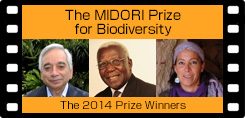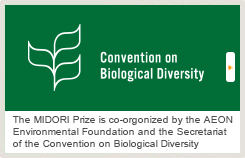The MIDORI Prize for Biodiversity 2014

- Kamal Bawa
- India
President, Ashoka Trust for Research in Ecology and the Environment (ATREE), India
Distinguished Professor, University of Massachusetts, Boston
Remarks
I am very thankful to the AEON Environmental Foundation for recognizing our work in biodiversity by awarding me the MIDORI Prize. The prize underscores the importance of biodiversity to humanity, and the approach to biodiversity conservation that my own research program at the University of Massachusetts at Boston, and ATREE, the action-research center I established in India, have advocated during the past few decades. The core of this approach involves generating interdisciplinary knowledge that has a transformative impact on policy and action on the ground, promotes participatory governance, and builds local capacity for conservation and sustainable use of biodiversity. Such a comprehensive multi-pronged approach is needed to meet the complex biodiversity and developmental goals that the Parties to Convention on Biological Diversity (CBD) have identified for the current decade. Populous tropics, particularly countries like India, offer a challenge to those who are interested in biodiversity conservation on one hand and betterment of the human condition on the other. India indeed is making strides in both. And ATREE has been at the forefront of such efforts in the country and beyond. Within a short span of 18 years, and with dedication and commitment of its staff, ATREE through its research, education, and outreach programs has emerged as a top-ranked environmental center in Asia. For me the MIDORI Prize represents a reaffirmation of our values and beliefs, and a reminder of complex challenges that lie ahead.
Reasons for Awarding the Prize
Dr. Kamal Bawa (b. 1939) has made intellectual contributions to biodiversity science through ground-breaking research on conservation and rural livelihoods in biodiversity hotspots, publishing nearly 200 research articles and 10 books or monographs. He discovered new modes of reproduction in tropical forest trees that changed prevailing notions about their ecology and evolution; he developed a new class of genetic markers for tropical forest trees, and showed that forest fragmentation, widespread in the tropics, depletes biodiversity; he developed new paradigms and tools for conservation; explored synergies between conservation and social goals such as poverty reduction; and identified conservation priorities in biodiversity hotspots.
Dr. Bawa established the Ashoka Trust for Research in Ecology and the Environment (ATREE) in India as a major research center for biodiversity conservation and sustainable development. ATREE now supports three offices with seven satellite centers across India and employs over 155 staff. It takes innovative approaches to conservation and sustainability science, develops novel concepts and tools to manage scarce natural resources, and trains new leaders in interdisciplinary sustainability science. ATREE recently launched its own Academy for Conservation Science and Sustainability Studies, with an interdisciplinary doctoral program. ATREE has emerged as one of India’s premier conservation organizations, influencing biodiversity research and policy within India, and providing a model for environmental organizations across the world. A recent study of think tanks worldwide by the University of Pennsylvania rated ATREE as the top environmental think tank in Asia and the 19th ranked environmental think tank in the world, two years in arrow (2011 and 2012).
As chair or member of governing councils of several international groups, Dr.Bawa has influenced the direction of conservation science, action and policy. As President of the Association for Tropical Biology and Conservation, he has guided the development of a strategic plan for conservation for the 21st century. For an international panel on biodiversity in agricultural systems, he coauthored a plan to enhance biodiversity in agricultural landscapes. He played a key role in the development of strategic conservation plans for the Western Ghats and Eastern Himalaya biodiversity “hotspots.” He has written two popular coffee-table books on India’s biodiversity hotspots, Sahyadris: India’s Western Ghats, and Himalaya: Mountains of Life --the only effort to compile popular accounts of two biodiversity hotspots anywhere, and he has co-authored a major textbook for conservation biologists —Conservation Biology: A Primer for South Asia.
Altogether, Dr. Bawa has achieved notable outcomes through research, the establishment of the ATREE, influence on global institutions and organizations, and writings in biodiversity conservation and sustainable development.
Profile
Dr. Kamal Bawa is President of a world-class think and do tank, the Ashoka Trust for Research in Ecology and the Environment (ATREE) in Bangalore, India and Distinguished Professor at the University of Massachusetts, Boston, USA. Dr. Bawa has generated significant win-win solutions that serve as models for conservation across the globe through tackling the compatibility of both the economy and the conservation of biodiversity. Dr. Bawa traverses the North-South divide, making contributions to India, Costa Rica, United States and the world. His pioneering work on the sustainability of non-timber forest product extraction demonstrated that conservation and human well-being could be simultaneously achieved.
Dr. Bawa has made distinguished intellectual contributions to biodiversity science through ground-breaking research on conservation. He discovered new modes of reproduction in tropical forest trees that changed prevailing notions about their ecology and evolution. Also, he developed a new class of genetic markers for tropical forest trees, and showed that forest fragmentation, widespread in the tropics, depletes biodiversity. He developed new paradigms and tools for conservation, explored synergies between conservation and social goals such as poverty reduction, and identified conservation priorities in biodiversity hotspots. He has taught 2000 students and mentored 30 doctoral and postdoctoral scholars.
In 1996 Dr. Bawa founded ATREE in India. ATREE’s work has been unique for its interdisciplinary approaches, and has shaped the policy agenda including work leading to nomination of the Western Ghats as a UNESCO World Heritage Site, a ban on mining in a national park, and implementation of the Forest Rights Act. With a core research staff of 80, 27 with doctoral degrees, ATREE is operating a new interdisciplinary doctoral program in biodiversity science in order to build the manpower India badly needs to successfully conserve in the 21st century. ATREE is a model for a research, education and policy institution not just in India or the developing world, but across the world. A University of Pennsylvania group has rated ATREE as the #1 environmental think tank in Asia and 19th in the world (2011 and 2012).
Dr. Bawa has shaped the direction of conservation science, action and policy through serving as President of the Association for Tropical Biology and Conservation, as founder and editor-in-chief of an international, interdisciplinary journal, Conservation and Society and as a member of the National Geographic Society’s Committee for Research and Exploration. Furthermore, Dr. Bawa led efforts to establish the India Biodiversity Portal, and has contributed to raising awareness of biodiversity.
* This profile was prepared in 2014.
Biographical Summary
- 1939
- Born in Kapurthala, Punjab, India
- 1960
- B.Sc. in Botany, Punjab University
- 1962
- M.Sc. in Botany (Honours), Punjab University
- 1967
- Ph.D. in Botany, Punjab University
- 1967-1972
- Postdoctoral Research Associate and Instructor, College of Forest Resources,University of Washington, Seattle, WA
- 1974-1981
- Assistant Professor (1974-1977), Associate Professor (1977-1981)
Department of Biology, University of Massachusetts, Boston - 1986-1996
- Professor, Department of Biology, University of Massachusetts,Boston
- 1989-1992
- Chairman, Biology Department, University of Massachusetts,Boston
- 1996-present
- President, Ashoka Trust for Research in Ecology and the Environment (ATREE), Bangalore, India
- 1996-present
- Distinguished Professor of Biology, Biology Department, University of Massachusetts, Boston
Record of Honors and Awards
- 1972
- Maria Moors Cabot and Charles Bullard Research Fellowships, Harvard University
- 1981
- Chancellor's Award for Distinction in Scholarship, University of Massachusetts, Boston
- 1984, 88, 96, 99
- Dean's Outstanding Achievement Award, University of Massachusetts, Boston
- 1987-1988
- Guggenheim Fellowship
- 1991-1994
- Research Professor, University of Massachusetts, Boston
- 1991-1996
- Pew Scholar in Conservation and the Environment
- 1996-present
- Distinguished Professorship, University of Massachusetts, Boston
- 2003
- Honorary Fellow, Association for Tropical Biology and Conservation
- 2007
- Chancellor's Award for Distinction in Service, University of Massachusetts, Boston
- 2009
- Distinguished Service Award 2009, Society for Conservation Biology
- 2009
- Charles Bullard Research Fellow, Harvard University
- 2009
- Giorgio Ruffolo Research Fellow in Sustainability Science, Harvard University
- 2012
- Elected Fellow of the American Academy of Arts and Sciences
- 2012
- Gunnerus Award (Prize) in Sustainability Research bestowed by the Royal Norwegian Society of Sciences and Letters
- 2014
- Honorary Doctor of Science, University of Alberta, Edmonton, Canada
Related Website
Dr. Bawa gets first Gunnerus Award for Sustainability










